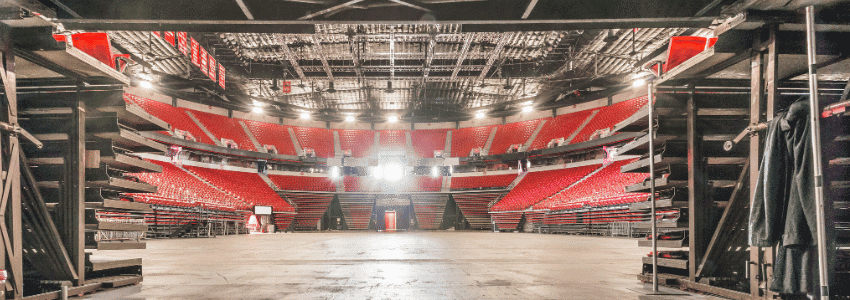Last Updated on January 25, 2023 by Mark Norman
Organising music concerts is a challenge and there are a variety of issues you’ll need to take into consideration. I was a music venue manager for the best of ten years and was involved in hundreds of music concerts.
This post is designed to be a helpful guide to the steps you should consider when planning an event like this.
But, before you do anything, think about why you’re putting the event on and what do you want to get out of it? Maybe you’re looking to help build the reputation of the band or artist, perhaps you’re looking make money from this, build your own reputation or maybe as a fundraiser.
Once you understand why you are organising the concert, consider the following ten steps to sucess:
1. Set a budget
One of the first things that you’ll want to do when planning any music concert or gig is to set a comprehensive and realistic budget that covers how your event makes money and how the event spends money.
For most music concerts or gigs, income will come from tickets, but you might want to consider other alternatives such as sponsorship and online fundraising platforms like gofundme or patreon if you’re just getting started and this is something that you’re thinking of doing regularly.
Within your expenditure you will need to consider what are the fixed costs and what are the variable costs. A fixed cost is a one that doesn’t vary as the number of people increases.
For example, a fixed cost could be your basic venue hire fee. This is a fixed cost because normally it won’t change anything different if you have 10 people or 100 people. Here are some examples of more fixed costs:
- Basic venue hire
- Band or artist fee
- Technical cost of putting the show on
In addition to fixed costs you need to also consider the variable costs. These are costs that will alter depending on the number of people that you have in the venue.
So, let’s say that you start off planning for 50 people to attend your event. You may think you only need two members of security at this point. Now imagine ticket sales go really well and you expect 100 people to attend.
Now, this cost has varied and potentially you may need 4 security staff. Here are some examples of other variable expenditure:
- Ticket printing
- Staff (security/bar staff)
- Promotional materials
A final word on this topic, don’t forget to account for any taxes you may be liable for depending on the country you operate in.
2. Identify your target audience

One of the single most important things that you can do to ensure the success of your music concert or gig is to identify who your target audience is through the creation of a target audience profile.
Now you might think: ‘this is easy, it is simply the fans of the bands that are performing’. And yes, you would be right in one respect this is true.
But knowing this doesn’t give the full picture and it certainly will not always help you to market and promote your music concert or gig successfully.
You should try to consider both geographic and demographic elements that make up your target audience. If you are based in the UK, a good free resource for this is Audience Finder.
This will pay dividends and save you money because you will not be advertising in those geographical areas, on websites or on social media platforms that your target audience just isn’t looking at. So how do you start this process?
Geographic elements are those which describe where people live. There are many ways to do this and it depends very much in which country in which you live.
You may decide to restrict advertising to just your local area, and this may be largely dictated by the artist appeal for who is playing. The bigger the artist the wider the advertising radius you may need to consider.
Demographic elements describe those characteristics of your target audience which help you too target them better with your advertising. Demographic elements include things like:
- gender
- age
- income
- educational level
- ethnicity
- family life cycle
Using these elements, you can create the ideal profile of a person most likely to come to your event and therefore be highly precise with your marketing (see marketing below).
3. Book your artists

This step may be undertaken in parallel with step 4. There are several ways that you can approach booking artists or bands for your music concert or gig. Having contacts can be key, but reaching out to artists or their respresentatives will require good communication skills.
If the event is a local band night, it may be as simple as reaching out to the band through their appropriate social media channel. If the band has a slightly higher profile this route may still work but it is likely you will need to speak to their management or booking agent.
Sometimes this information is included in the footer or about us page on the band’s website, but other times this may not be readily available and may require further investigation using Google or another search engine. Check out Showcase for agents in the UK.
You will want to negotiate a fee with the band. This is highly dependent on the bands current profile and standing. Be prepared to negotiate and to haggle and don’t be surprised if the band fee is higher than you expected.
Many bands now rely heavily on playing live events as their income through music sales has declined in recent years with the move to online streaming services.
It is not untypical for booking agents to attempt to charge a higher fee to new promoters over ones which they have worked with for years, something to watch out for!
Bigger bands can command multiple thousands of pounds to perform, so you should do some research to understand those bands available in your price category.
One possible tactic to help reduce the fee that you pay (and this works particularly well for festivals) is to buddy up with another event, so the band effectively gets 2 dates rather than one.
A small word of caution here you will need to make sure that both events all within reasonable travel distance and consider any other technical requirements of the band playing two gigs in quick succession.
Once negotiation is complete you should agree a contract with the artist. For local bands and artists this may be an informal agreement between you although it is good to have it in writing.
Larger bands will have pre-made performance contracts. It is important to read these through thoroughly before signing as you are committing yourself to paying the fee and providing all technical and refreshment riders that are included with it.
4. Find a venue

When you set your initial budget, you will have an idea for the number of people you expect to attend your event, and this should be the first thing you look at in any potential venue.
Search the local area for venues with the required capacity and then check that the venues have the capabilities to host live music concerts or gig. Here are some examples of the criteria you need to check with any venue to see if it is suitable to host live music
- What is the venue capacity?
- Is there a stage or raised platform big enough to accommodate the bands you want to book?
- Are there changing rooms or dressing rooms with direct access to the stage? Most bands usually require these.
- Is there sufficient electrical power for a sound system or PA?
- Does that the venue have its own PA set up for live music? This is typically two banks of speakers either side of the stage in a stereo format.
- What other technical equipment does the venue have to mix live band?
- Is there stage lighting?
- Is there a bar if required?
- Does the venue have the correct licences for hosting live music?
5. Set a date
Once you’ve set the budget and found your venue then you will need to set a date. You should allow for at least four to six weeks to market and promote the music concert or gig.
Any less than this and you risk the event being unsuccessful. Ideally you should book the date in many months in advance to allow for enough marketing and promotion.
It is likely that bands and venues also book months in advance, so you’ll need to be on top of your game in this aspect.
Many bands will tour indoor venues through the autumn and winter while playing outdoor events during the spring and summer months when the weather is better.
Of course, this is true only for the Northern Hemisphere, it’s the opposite for the Southern Hemisphere!
6. Organise tickets to go on sale
You will want to put tickets on sale as soon as possible. Before you do, consider what your ticketing strategy as this may encourage some early sales, which can be particularly useful when cash flow is tight.
One technique to get early ticket sales is to offer an early bird ticket price. This is a lower ticket price which is set either for a limited time or for a limited number of tickets.
You could decide to offer a free number of tickets in exchange for users sharing your event on their own social media. This will help with the reach of your event especially if you are just getting started.
You may want to have different pricing levels for different target audiences such as Under-18s, students or other concessions.
A final suggestion is to use the countdown clock strategy. This is like the early bird strategy, but you will need to set further price tiers and then display or notify attendees of any impeding change in price. Letting people know they have a limited time to buy a ticket at this price often works quite well in selling more tickets.
7. Promote the Event
One of the key reasons for considering your target audience before considering any type of marketing is that now you know which channels are likely to have the most effect in selling tickets for your music concert or gig.
You should allow for at least four to six weeks for promoting any event. In the case of music concerts or gigs and with long booking lead times you may be spending several months marketing the event.
To start, you should consider the target audience profile or profiles that you have drawn up.
It is perfectly acceptable to have more than one target market for an event. In fact, this allows you to operate several different efficient marketing strategies to reach each of your target audiences.
For example, one target audience may use Facebook as their social network of choice, while another chooses to use Instagram. You, therefore, need to consider different strategies for each of these two target audiences to have the most effect.
One marketing plan will focus on Facebook while the other will focus on Instagram and each of these social networks have very different content and presentation.
It is highly recommended that you then draw up a marketing plan to cover the time you will promote the event.
Often the simplest way to do this is to use a spreadsheet to identify the weeks and the different marketing channels you need to use for your target audience.
The different marketing channels should be based on the profile of your target audience.
7.1 Promote the Event on Social Media
Social media is the undisputed king of promoting events (although lets not totally rule out using local press still).
Saying this is only scratching the surface and digging deeper you need to understand how often you will need to post and what you will need to post.
Each social network will have different requirements.
Also consider that most social media platforms have algorithms designed to promote paid content over organic free content.
This means that if you have a Facebook group or page then not every member who likes that page or post group will see every post that you make.
You should, therefore, give some consideration to spending some advertising money on your social network of choice.
What you post is also key. the type of content should relate to your event and the artistes that are playing.
You could engage potential attendees with snippets of artist material, videos or shorts interviews.
One tactic that seems to work quite well is showing behind the scenes footage. The aim of this is to get people excited about your events before buying a ticket.
In recent times one of the more popular methods for promoting any event is to engage with influencers on social media networks.
In the case of music concerts and gigs you should engage with your bands or artistes who may have a following already on social networks but also try to identify influencers in your local area.
You could do this by offering them a free ticket to your event in exchange for some promotion to their audience.
7.2 Promote the Event in Local Press
While most of your promotion may take place on social networks, do not dismiss the power of your local press either in print or on listing websites.
Very often these will have their own email databases and are regularly sending out new events that they have listed and so this becomes an additional opportunity fee to increase the reach of your event.
8. Filming & Photography at the Event

You should consider having someone come to film or photograph your music concert or gig especially if you plan to run more events again in the future.
A photographer with a high-quality camera (DSLR etc.) should be used to ensure that the photos look professional. It can be difficult to photograph live music in dark lit venues so check they have experience in these areas.
The photos or video that are produced can then provide you with social media content after the event and for promoting your next show.
The concert photos and video will also help to build your own social media profile as people will be keen to like and share them after the event.
9. Health and Safety for the Event
Ensuring the safety of your event attendees, staff and performers is paramount. Not only to your business but also that of the venue.
You should familiarise yourself with the health and safety legislation in the country or region in which your event takes place.
In the UK the Health and Safety Executive (HSE) have a great website that gives an overview of responsibilities in this area.
It is likely that your venue will have overall responsibility for the safety of attendees during any event, but it is equally important that you familiarise yourself with their risk assessments and procedures in the event of an emergency.
You should also work with the venue to make them aware of all activities you will be undertaking as part of the event as it is likely that these will also need a risk assessment and method statement.
Safety in the UK is covered by the Health and Safety at Work etc Act 1979 , but there are also numerous other laws and regulations that you may need to consider, these include:
- Management of Health & Safety at Work Regulations 1999
- Reporting of Injuries, Diseases and Dangerous Occurrences Regulations 2013
- Control of Substances Hazardous to Health 2002
- Regulatory Reform (Fire Safety) Order 2005
- Noise at Work Regulations 2005
- Construction Design and Management Regulations 2015
- Electricity at Work Regulations 1989
10. Running the Show On the night

Before the event you will need to liaise with the band or the band’s management to decide what technical requirements are needed for the gig.
This is commonly referred to as a technical rider and will detail all of the setup requirements for the various instruments and vocals that the band needs to perform.
If your venue has an in-house technical team it is your responsibility to liaise this information to them.
The same goes if you are providing the technical sound system for the venue.
You should also consider where you might store any equipment such as flight cases and boxes while not in use. This is particularly challenging in small venues with little or no backstage area.
The post will not cover the specific technical requirements of mixing live music, but you should employ an experienced sound desk operator who will be able to mix the live concerts.
Larger bands often provide their own sound engineer for familiarity purposes.
You should draw up a plan of the day with a detailed timeline of when you need to be at the venue and when you require artistes to be at the venue.
You should allow some contingency time in this as it is not uncommon for artists to be running late. All artistes performing will require a sound check before they play at the event, this can take anywhere from 15 minutes to an hour.
You will also need to provide any additional food and drink riders not only for the artist members but also for any of their technical crew.
This is likely to be included with the booking contract and you will be given this information in advance.
Depending on the band and or the band manager present at the event there can be issues if the correct rider items are not provided!
Conclusion
So, there you have it a short overview of how to run a musical concerts or gig. These types of events are not for the faint-hearted and many people who operate in this sector have a passion for music that helps to drive them and their events forward.
The margins on live music can often be slim, especially where local bands are involved so you need to keep and grow your business acumen if you want to make this a regular business.
Share this content: